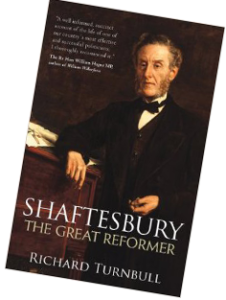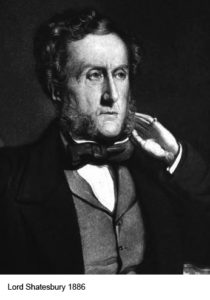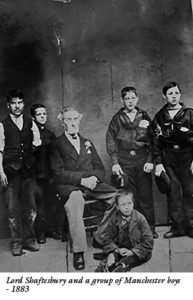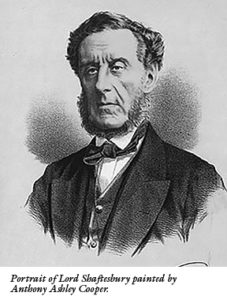Back to series


Recommended Reading:

The Great Reformer (Part 1)
The first of two articles dealing with the life and significance of the British evangelical social reformer, the seventh earl of Shaftesbury.
Click here to open a Print - Friendly PDF
| A year after the veteran antislavery campaigner William Wilberforce left Parliament in 1825, the future leader of evangelicalism in England entered the House of Commons.1 Anthony Ashley Cooper, known as Lord Ashley until his succession as seventh earl of Shaftesbury upon his father’s death in 1851, was a very different character from Wilberforce.2 Although less well known, he is, potentially, of greater importance. In two articles we will examine his life and significance.
Shaftesbury’s evangelical Christian vision of society was remarkable. He understood the role of government but also that it was limited. He believed in both the conversion of the soul and the transformation of society. This was primarily to be achieved by the actions of Christians working together in voluntary societies. He was driven by a combined sense of deep call from God and English aristocratic paternalism.
He often felt the world to be against him and suffered from introspection that bordered on the depressive. Indeed, Florence Nightingale once commented that had the earl of Shaftesbury not been committed to the reform of the asylum he would have been in one.3 Yet this same man was offered a cabinet office by both political parties of the day, three times in 1866 alone, and he declined on each occasion (though not without some anguish). Thousands of people lined the streets of London for his funeral. He was associated with hundreds of Christian voluntary societies. His motivations were profoundly theological. With an acute sense of the duties implied by a belief in the Second Advent of Christ, Shaftesbury successfully negotiated his way through the minefield of eschatology to produce a rounded, dynamic, and biblical understanding of Christian responsibility in society. His vision is one we would do well to recover. This first article will set the scene and look at his early years, the campaigns for the mentally ill, the conditions of children in factories and mines, and the role of Christian voluntary societies. In the second article we will consider his theological motivations, his sometimes controversial ecclesiastical campaigns, the struggle for the “climbing boys,” and his place in history. Upbringing, Conversion, and Call
|
|||
| Notes: 1. The British Parliament in 1825 consisted of a lower house, the House of Commons, elected on a limited franchise, and an upper house, the House of Lords, consisting of the holders of aristocratic seats and titles. 2. The title Lord Ashley will be used for reference to the period prior to 1851, Shaftesbury for the post-1851 years. Shaftesbury will also be used for generic description and assessment. 3. Richard Turnbull, Shaftesbury: The Great Reformer (London: Lion Hudson, 2010), 10. 4. The two main political parties in this era were the Tories and the Whigs, though there was a sizable independent constituency and much fluidity at the edges. In essence, the Tories represented the traditional landed interest, and the Whigs the more reform-minded merchant classes. 5. Turnbull, Shaftesbury, 16. 6. Dissenters was the term used for religious independents who “dissented” from the established Church of England. They were also sometimes described as nonconformists. 7. A “high Tory” was one who gave special weight to the responsibilities as well as the privileges of the landed interest, not least toward the less fortunate. It was often combined with a position known as Protestant constitutionalism or national Protestantism, a view of the centrality and importance of the Protestant constitution to the British nation. 8. Lord Ashley, Diaries, October 13, 1825, cited in Turnbull, Shaftesbury, 21. 9. The full title was A Practical View of the Prevailing Religious System of Professed Christians in the Higher and Middle Classes in This Country Contrasted with Real Christianity. 10. The rather inappropriate title was coined by later critics; it referred to the group of mainly lay Christian business leaders and politicians who gathered around Wilberforce in Clapham, then a village some three miles from London. 11. Turnbull, Shaftesbury, 35–36. 12. Lord Ashley, Diaries, April 22, 1827; cited in Turnbull, Shaftesbury, 24. 13. Lord Ashley, Diaries, February 22, 1827; cited in Turnbull, Shaftesbury, 24. 14. Turnbull, Shaftesbury, 28. 15. Ibid., 76. 16. Ibid., 87. 17. Lord Ashley in the House of Commons, June 7, 1842; cited in Turnbull, Shaftesbury, 88. 18. Lord Ashley, Diaries, June 9, 1842; cited in Turnbull, Shaftesbury, 89. 19. Lord Ashley, Diaries, August 8, 1842; cited in Turnbull, Shaftesbury, 90. 20. Turnbull, Shaftesbury, 216. 21. Ibid., 139. 22. Shaftesbury, Diaries, March 16, 1870; see Turnbull, Shaftesbury, 151. |
|||

Richard Turnbull
Pastor Richard Turnbull is the director of the Centre for Enterprise, Markets and Ethics and a trustee of the Christian Institute. Richard also holds a first class honors degree in Theology and Ph.D. in Theology from the University of Durham. He was ordained into the ministry of the Church of England in 1994. Richard served in the pastoral ministry for over 10 years. He was also for 7 years the Principal of Wycliffe Hall, Oxford. He has authored several books, is a Fellow of the Royal Historical Society and a visiting Professor at St Mary’s University, Twickenham.
Recommended Reading:
Richard Turnbull, Shaftesbury, The Great Reformer, Lion Hudson, London 2010
 Shining new light on one of Britain’s most celebrated figures, this new biography insightfully explores the beliefs underlying Shaftesbury’s passion for the poor.
Shining new light on one of Britain’s most celebrated figures, this new biography insightfully explores the beliefs underlying Shaftesbury’s passion for the poor.
Drawing extensively from Lord Shaftesbury’s private journals, this accessible biography shows not just the story of his life—from his happy marriage and many children to his acts of Parliament—but also how his faith led and equipped him to fight for justice in society. Lord Shaftesbury was one of the best loved politicians and social reformers of nineteenth century England. His deep compassion for the poor was legendary, as were his tireless campaigns to limit factory hours, stop the use of boys as chimney sweeps and children in coalmines, and to develop universal education. As a result he changed the character of English society forever. Revealing a moving portrait of a sensitive thinker, areas covered in this important biography include his upbringing and education; his work as a politician and his campaign for mental health; his contribution towards the founding of the Bible Society; his role as a defender of the Protestant faith; his personal theology; and much more..
 COPYRIGHT: This publication is published by C.S. Lewis Institute; 8001 Braddock Road, Suite 301; Springfield, VA 22151. Portions of the publication may be reproduced for noncommercial, local church or ministry use without prior permission. Electronic copies of the PDF files may be duplicated and transmitted via e-mail for personal and church use. Articles may not be modified without prior written permission of the Institute. For questions, contact the Institute: 703.914.5602 or email us.
COPYRIGHT: This publication is published by C.S. Lewis Institute; 8001 Braddock Road, Suite 301; Springfield, VA 22151. Portions of the publication may be reproduced for noncommercial, local church or ministry use without prior permission. Electronic copies of the PDF files may be duplicated and transmitted via e-mail for personal and church use. Articles may not be modified without prior written permission of the Institute. For questions, contact the Institute: 703.914.5602 or email us.
-
Recent Podcasts
Ralph Waldo Emerson’s Philosophy and Influence
by David George Moore on July 26, 2024Ralph Waldo Emerson was a gifted nineteenth century...Read More
-
The Side B Stories – Nate Sala’s Story
by Jana Harmon, Nate Sala on July 19, 2024
-
Terrorism Through the Eyes of Faith
by Dennis Hollinger on July 12, 2024
-
Recent Publications
Hasn’t Science Proven That Belief in God Is an Outdated Superstition?
by Sharon Dirckx on July 1, 2024Many assume that scientific practice and belief in...Read More
-
Has the Bible Been Corrupted as Some Muslims Claim?
by Andy Bannister on June 1, 2024
-
Seeing Jesus Through the Eyes of Women
by Rebecca McLaughlin on May 15, 2024
0
All Booked
0.00
All Booked
0.00
All Booked
22194
C.S. Lewis’s The Abolition of Man Live Online Small Group 8:00 PM ET
https://www.cslewisinstitute.org/?event=c-s-lewiss-the-abolition-of-man-study-course&event_date=2024-10-02®=1
https://www.paypal.com/cgi-bin/webscr
2024-10-02

Next coming event
Days
Hours
Minutes
Seconds
C.S. Lewis’s The Abolition of Man Live Online Small Group 8:00 PM ET
On October 2, 2024 at 8:00 pmSpeakers

Richard Turnbull
Pastor
Team Members

Richard Turnbull
PastorRichard Turnbull is the director of the Centre for Enterprise, Markets and Ethics and a trustee of the Christian Institute. Richard also holds a first class honors degree in Theology and Ph.D. in Theology from the University of Durham. He was ordained into the ministry of the Church of England in 1994. Richard served in the pastoral ministry for over 10 years. He was also for 7 years the Principal of Wycliffe Hall, Oxford. He has authored several books, is a Fellow of the Royal Historical Society and a visiting Professor at St Mary’s University, Twickenham.



 There was nothing particularly unusual about the early life of the young aristocrat. His father had become the sixth earl of Shaftesbury in 1811, and the natural course for Ashley would be to enter politics. Ashley was duly elected the Tory member of Parliament for Woodstock, near Oxford, in the general election of 1826, a contest notorious as the “no popery” election. The issue at large was that of increasing civil liberties for dissenters6 and for Roman Catholics. Ashley was emerging as a rather fervent “high Tory.”7
There was nothing particularly unusual about the early life of the young aristocrat. His father had become the sixth earl of Shaftesbury in 1811, and the natural course for Ashley would be to enter politics. Ashley was duly elected the Tory member of Parliament for Woodstock, near Oxford, in the general election of 1826, a contest notorious as the “no popery” election. The issue at large was that of increasing civil liberties for dissenters6 and for Roman Catholics. Ashley was emerging as a rather fervent “high Tory.”7 More well known among the early campaigns are those concerned with the welfare of children in factories and mines. The poet Robert Southey referred to “the white slave trade.”15
More well known among the early campaigns are those concerned with the welfare of children in factories and mines. The poet Robert Southey referred to “the white slave trade.”15 Shaftesbury worked closely with the City Mission and the Ragged School Union to achieve his objectives. He walked the streets ofLondon with the City Missionaries, gathering evidence for his parliamentary campaigns, encouraging the Christian workers and preaching the gospel.
Shaftesbury worked closely with the City Mission and the Ragged School Union to achieve his objectives. He walked the streets ofLondon with the City Missionaries, gathering evidence for his parliamentary campaigns, encouraging the Christian workers and preaching the gospel.

